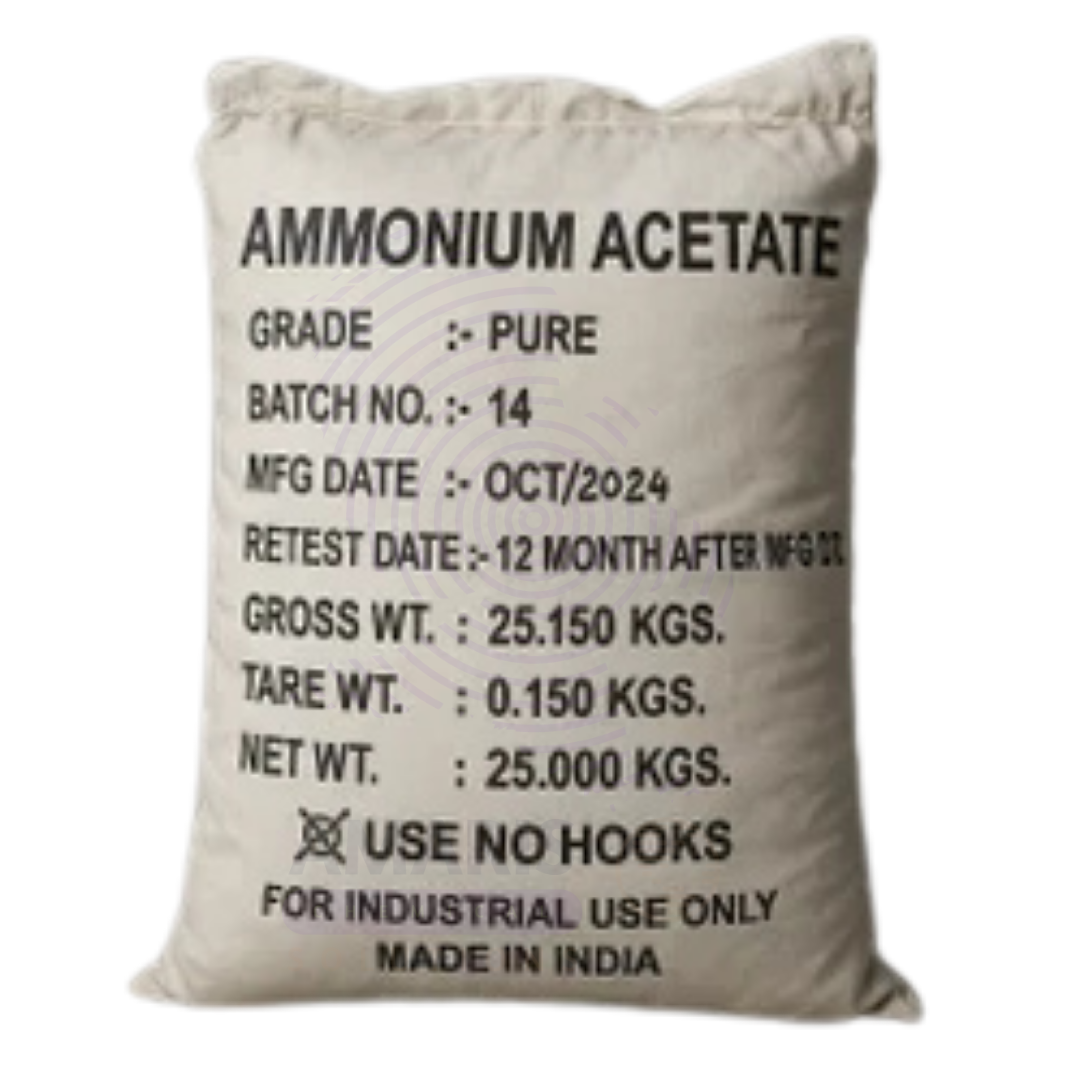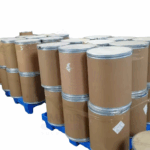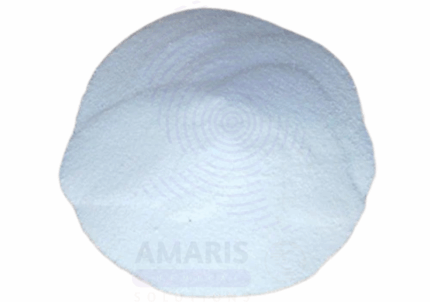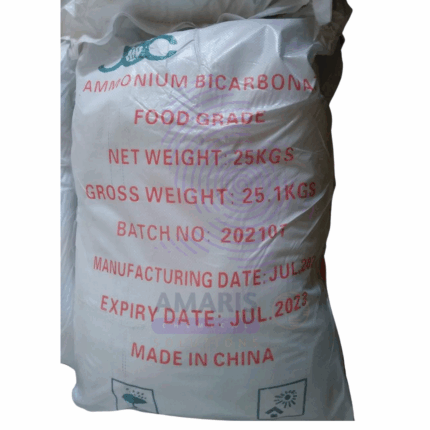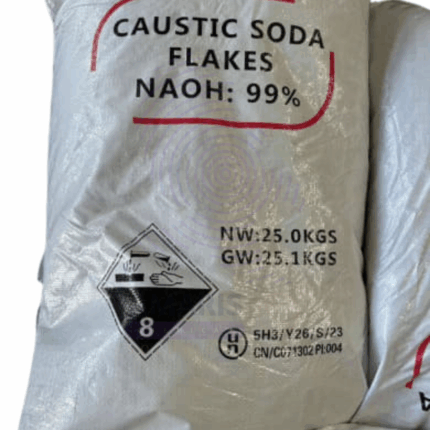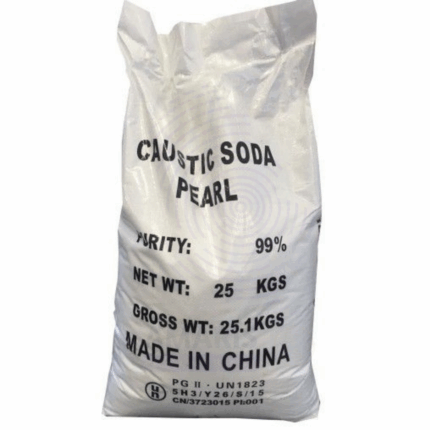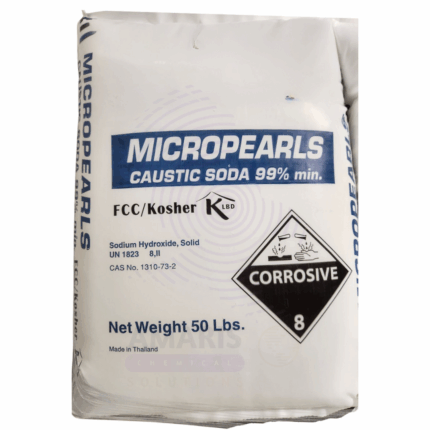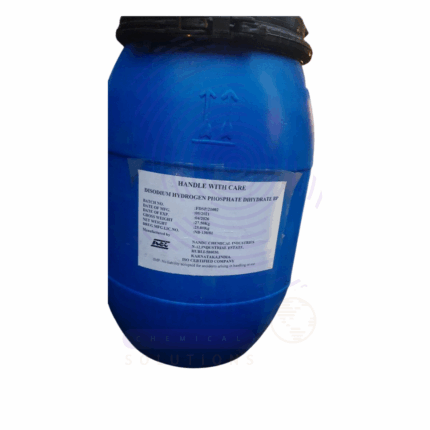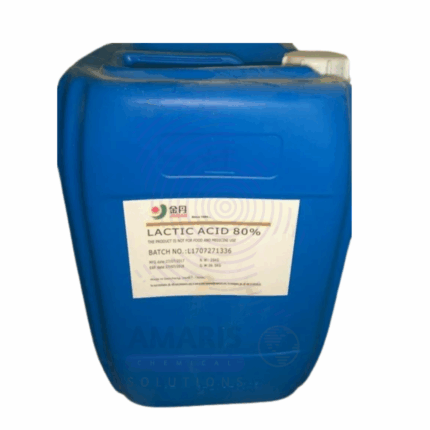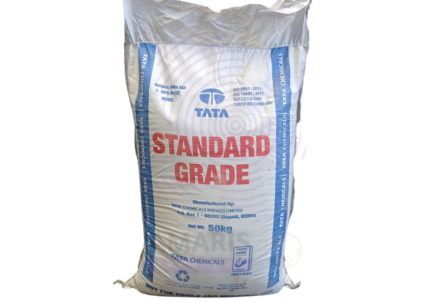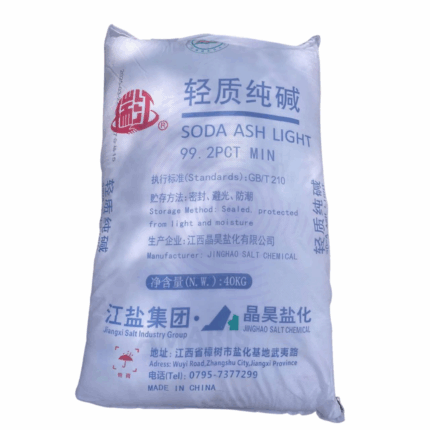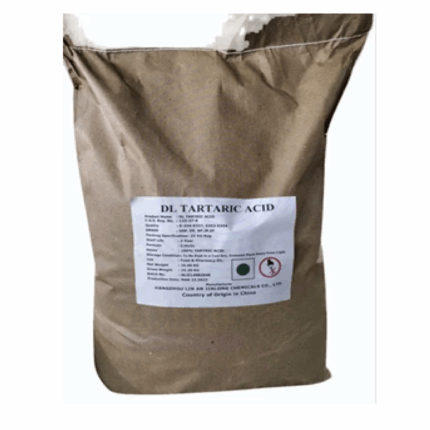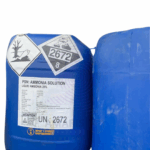
Ammonia solution
$ 1.65 Original price was: $ 1.65.$ 1.55Current price is: $ 1.55.
Ammonium Acetate
$ 1.71 Original price was: $ 1.71.$ 1.62Current price is: $ 1.62.
Whatsapp Order
Ammonium acetate is a white crystalline solid or granular powder that is highly soluble in water. It is the ammonium salt of acetic acid and commonly appears as a colorless, odorless compound. Ammonium acetate is widely used in laboratories, chemical synthesis, food industry, pharmaceuticals, and industrial applications due to its buffering capacity and ability to provide both ammonium and acetate ions in solution. It functions as a neutral salt and is valued for its role as a pH buffer, reagent, and stabilizer.
Categories: Acidulants, Dyes and Pigments, pH Adjusters
Tags: Ammonium acetate, Food additive, Pharmaceutical intermediate, Water treatment
Description
Table of Contents
Toggle
Ammonium Acetate
Primary Uses
- Buffering Agent in Biochemistry and Molecular Biology
- Used extensively as a buffering agent in biochemical applications, especially in nucleic acid and protein purification techniques such as DNA and RNA precipitation.
- Maintains pH stability in electrophoresis and chromatography.
- Helps stabilize enzyme activity during assays and molecular biology protocols.
- Chemical Synthesis
- Employed as a reagent in organic synthesis, for example, in the preparation of acetates and other chemical intermediates.
- Used in the manufacture of pharmaceuticals and dyes.
- Food Industry
- Functions as a food additive and acidity regulator (E264), used to control pH in processed foods and beverages.
- Acts as a stabilizer and preservative to extend shelf life.
- Often found in baking powders and gelatin preparations.
- Pharmaceutical Industry
- Utilized as an excipient or buffering agent in drug formulations to maintain pH stability and improve drug solubility and bioavailability.
- Sometimes used in intravenous fluids and injectable formulations.
- Textile Industry
- Used in textile printing and dyeing as a neutralizing agent and buffer.
- Helps in fixing dyes and improving color fastness.
Secondary Uses
- Analytical Chemistry
- Serves as a standard in titrations and analytical calibrations.
- Used in mass spectrometry as a volatile buffer to improve ionization and peak shape.
- Laboratory Uses
- Employed as a reagent for buffer solutions in chemical and biochemical labs.
- Used in some chemical experiments as a source of acetate and ammonium ions.
- Agriculture
- Occasionally used as a nitrogen source or soil conditioner, though less common compared to other ammonium salts.
- Cosmetics
- Incorporated in some cosmetic products as a pH adjuster and buffering agent.
KEY PRODUCT FEATURES
1. Basic Identification Attributes
- Chemical Name (IUPAC): Ammonium acetate
- Common/Trade Names: Ammonium acetate
- CAS Number: 631-61-8
- HS Code: 2915.90.00
- Molecular Formula: C2H7NO2
- Synonyms: Acetic acid ammonium salt, Ammonium ethanoate
2. Physical & Chemical Properties
- Physical State: White crystalline powder or granules
- Color & Odor: Colorless to white, odorless or faint vinegar-like odor
- Melting Point: 114–117°C (decomposes)
- Boiling Point: Decomposes before boiling
- Density: ~1.175 g/cm³
- Solubility: Highly soluble in water (~290 g/L at 20°C), slightly soluble in alcohol
- pH Level: Neutral to slightly basic (~7–8 in aqueous solution)
- Vapor Pressure: Negligible
- Flash Point: Non-flammable
- Autoignition Temperature: N/A
- Stability: Stable under normal conditions
3. Safety & Hazard Attributes
- Hazard Class (GHS): Generally considered non-hazardous
- NFPA Ratings: Health 1, Flammability 0, Reactivity 0
- Exposure Limits: No established OSHA PEL or ACGIH TLV
- Reactivity: Stable, but decomposes with strong acids or bases releasing ammonia or acetic acid vapors
- Incompatible Materials: Strong oxidizers, strong acids, strong bases
4. Storage & Handling Attributes
- Storage Conditions: Store in a cool, dry place away from moisture and incompatible materials
- Container Type: Plastic or glass containers, tightly sealed
- Shelf Life: Typically 2-3 years if stored properly
- Special Handling: Avoid dust generation; use in well-ventilated areas; wear PPE during handling
5. Regulatory & Compliance Attributes
- Regulatory Status: Approved for use in food and pharmaceuticals with restrictions
- Transportation: Not classified as hazardous; normal transport conditions apply
- Waste Disposal: Dispose according to local regulations; generally non-hazardous waste
6. Environmental & Health Impact
- Ecotoxicity: Low toxicity to aquatic organisms
- Persistence: Biodegradable
- Carcinogenicity: Not classified as carcinogenic
- Biodegradability: Readily biodegradable
SAFETY HANDLING PRECAUTIONS
Safety Handling Precautions
- PPE: Use gloves, safety goggles, and dust masks when handling powder to prevent skin, eye, and respiratory exposure.
- Handling: Avoid dust inhalation; work in well-ventilated areas.
- Storage: Keep containers tightly sealed and store in dry areas to prevent caking.
- Hygiene: Wash hands after use; avoid eating or drinking during handling.
First Aid Measures
- Inhalation: Move affected person to fresh air. Seek medical attention if irritation persists.
- Skin Contact: Wash with soap and water; seek medical advice if irritation develops.
- Eye Contact: Rinse immediately with water for at least 15 minutes; consult a doctor if irritation continues.
- Ingestion: Rinse mouth; drink water. Seek medical advice if large quantities are ingested.
Firefighting Measures
- Fire Hazards: Non-flammable; may decompose at high temperatures releasing ammonia and acetic acid vapors.
- Extinguishing Media: Use water spray, dry chemical, foam, or CO₂ to extinguish surrounding fire.
- Special Precautions: Firefighters should wear self-contained breathing apparatus (SCBA) due to possible toxic gases.
Related products
Ammonia Acetate
Ammonia Acetate is a white crystalline solid or granular powder with a mild ammoniacal odor. It is a salt formed from ammonia and acetic acid, widely used in laboratories, industrial processes, and some niche food and pharmaceutical applications. Ammonium Acetate is highly soluble in water and often utilized as a buffer solution in biochemical and analytical chemistry due to its ability to maintain pH. It also serves as a precursor in the synthesis of various chemicals and acts as a neutralizing agent in several industrial applications.
Ammonium Bicarbonate
Ammonium bicarbonate is a white crystalline powder or granules with a slightly alkaline taste and a characteristic ammoniacal odor. It is a white solid that decomposes readily on heating, releasing ammonia, carbon dioxide, and water vapor. It is widely used in the food industry as a leavening agent, in chemical synthesis, and in various industrial applications. Its unique property of decomposing to release gases makes it valuable for baking and other processes where gas release is desired.
Caustic Soda Flakes (Sodium Hydroxide)
Caustic Soda Flakes, also known as Sodium Hydroxide Flakes (NaOH), are a highly alkaline, white, solid substance that is crystalline and flaky in form. Produced by evaporating aqueous sodium hydroxide solutions, these flakes are highly soluble in water and exhibit strong corrosive properties. Caustic Soda Flakes are widely used in a variety of industrial, chemical, and manufacturing processes due to their strong alkalinity, ability to saponify fats, and effectiveness in pH adjustment. Their high purity and ease of handling in flake form make them suitable for use in chemical synthesis, pulp and paper production, water treatment, and detergent manufacturing.
Caustic Soda Pearls
Caustic Soda Pearls are small, solid, spherical particles of sodium hydroxide (NaOH) produced by a controlled cooling and solidification process. These pearls offer superior flowability, uniform size distribution, and reduced dust generation compared to flake or powder forms. They are highly soluble in water, exhibiting a strong alkaline nature with vigorous exothermic dissolution. Caustic Soda Pearls are widely used across industries including chemical manufacturing, water treatment, pulp and paper processing, and detergents due to their purity, ease of handling, and efficient dissolution characteristics.
Disodium Hydrogen Phosphate Dihydrate
Disodium Hydrogen Phosphate Dihydrate is the hydrated form of disodium hydrogen phosphate, a white crystalline powder commonly used as a buffering agent, emulsifier, and sequestrant. The dihydrate form contains two water molecules per formula unit, which affects its physical properties such as melting point and solubility. It is widely applied in food, pharmaceutical, water treatment, and industrial processes to maintain pH stability, improve texture, and supply essential sodium and phosphate ions.
Lactic Acid
Lactic Acid is a colorless to pale yellow, viscous liquid with a mild acidic odor. It is an organic acid naturally produced by fermentation and widely used in industrial, pharmaceutical, cosmetic, and food applications. The 80% concentration provides a balance of potency and ease of handling, making it suitable for pH adjustment, preservation, and chemical synthesis. Lactic acid is biodegradable, non-toxic, and valued for its multifunctionality including antimicrobial properties and chelation abilities.
Sodium Carbonate (Magadi Soda)
Sodium Carbonate (Magadi Soda) is an inorganic white powder with the chemical formula Na₂CO₃. It is a key industrial alkali used in glass manufacturing, water treatment, and chemical production. This light-density form is highly soluble and reacts with acids to form salts, making it essential for pH regulation and as a cleaning agent in various industrial processes.
Tartaric Acid
Tartaric Acid is a naturally occurring organic acid found in many plants, particularly grapes. It is widely used in the food, pharmaceutical, and chemical industries due to its acidic properties and ability to act as a chiral building block in synthesis. This crystalline acid enhances flavor, stabilizes products, and serves as a key ingredient in baking powders, effervescent tablets, and various industrial applications.


 Preservatives(food)
Preservatives(food) Flavor Enhancers
Flavor Enhancers Acidulants
Acidulants Sweeteners
Sweeteners Antioxidants
Antioxidants Colorants(food)
Colorants(food) Nutraceutical Ingredients (food)
Nutraceutical Ingredients (food) Nutrient Supplements
Nutrient Supplements Emulsifiers
Emulsifiers
 Collectors
Collectors Dust Suppressants
Dust Suppressants Explosives and Blasting Agents
Explosives and Blasting Agents Flocculants and Coagulants
Flocculants and Coagulants Frothers
Frothers Leaching Agents
Leaching Agents pH Modifiers
pH Modifiers Precious Metal Extraction Agents
Precious Metal Extraction Agents
 Antioxidants(plastic)
Antioxidants(plastic) Colorants (Pigments, Dyes)
Colorants (Pigments, Dyes) Fillers and Reinforcements
Fillers and Reinforcements Flame Retardants
Flame Retardants Monomers
Monomers Plasticizers
Plasticizers Polymerization Initiators
Polymerization Initiators Stabilizers (UV, Heat)
Stabilizers (UV, Heat)
 Antifoaming Agents
Antifoaming Agents Chelating Agents
Chelating Agents Coagulants and Flocculants
Coagulants and Flocculants Corrosion Inhibitors
Corrosion Inhibitors Disinfectants and Biocides
Disinfectants and Biocides Oxidizing Agents
Oxidizing Agents pH Adjusters
pH Adjusters Scale Inhibitors( water)
Scale Inhibitors( water)
 Antioxidants(cosmetic)
Antioxidants(cosmetic) Emollients
Emollients Fragrances and Essential Oils
Fragrances and Essential Oils Humectants
Humectants Preservatives
Preservatives Surfactants(cosmetic)
Surfactants(cosmetic) Thickeners
Thickeners UV Filters
UV Filters
 Fertilizers
Fertilizers Soil Conditioners
Soil Conditioners Plant Growth Regulators
Plant Growth Regulators Animal Feed Additives
Animal Feed Additives Biostimulants
Biostimulants Pesticides (Herbicides, Insecticides, Fungicides)
Pesticides (Herbicides, Insecticides, Fungicides)
 Active Pharmaceutical Ingredients (APIs)
Active Pharmaceutical Ingredients (APIs) Excipients
Excipients Solvents(pharmaceutical)
Solvents(pharmaceutical) Antibiotics
Antibiotics Antiseptics and Disinfectants
Antiseptics and Disinfectants Vaccine Adjuvants
Vaccine Adjuvants Nutraceutical Ingredients (pharmaceutical)
Nutraceutical Ingredients (pharmaceutical) Analgesics & Antipyretics
Analgesics & Antipyretics
 Analytical Reagents
Analytical Reagents Solvents(lab)
Solvents(lab) Chromatography Chemicals
Chromatography Chemicals Spectroscopy Reagents
Spectroscopy Reagents microbiology-and-cell-culture-reagents
microbiology-and-cell-culture-reagents Molecular Biology Reagents
Molecular Biology Reagents Biochemical Reagents
Biochemical Reagents Inorganic and Organic Standards
Inorganic and Organic Standards Laboratory Safety Chemicals
Laboratory Safety Chemicals Specialty Laboratory Chemicals(Special Laboratory Equipment)
Specialty Laboratory Chemicals(Special Laboratory Equipment)
 Demulsifiers
Demulsifiers Hydraulic Fracturing Fluids
Hydraulic Fracturing Fluids Scale Inhibitors(oil)
Scale Inhibitors(oil) Surfactants(oil)
Surfactants(oil) Drilling Fluids
Drilling Fluids
 Dyes and Pigments
Dyes and Pigments Bleaching Agents
Bleaching Agents Softening Agents
Softening Agents Finishing Agents
Finishing Agents Antistatic Agents
Antistatic Agents
 Admixtures
Admixtures Waterproofing Agents
Waterproofing Agents Sealants and Adhesives
Sealants and Adhesives Curing Compounds
Curing Compounds Concrete Repair Chemicals
Concrete Repair Chemicals Anti-Corrosion Coatings
Anti-Corrosion Coatings
 Surfactants(cleaning)
Surfactants(cleaning) Builders
Builders Enzymes
Enzymes Solvents (Cleaning)
Solvents (Cleaning) Fragrances
Fragrances
 Electronic Chemicals
Electronic Chemicals Catalysts
Catalysts Lubricants
Lubricants Photographic Chemicals
Photographic Chemicals Refrigerants
Refrigerants Automotive chemicals
Automotive chemicals Pyrotechnic Chemicals
Pyrotechnic Chemicals
 Biodegradable Surfactants
Biodegradable Surfactants Bio-based Solvents
Bio-based Solvents Renewable Polymers
Renewable Polymers Carbon Capture Chemicals
Carbon Capture Chemicals Wastewater Treatment Chemicals
Wastewater Treatment Chemicals
 Pigments
Pigments Solvents(paint)
Solvents(paint) Specialty Coatings
Specialty Coatings Binders/Resins
Binders/Resins Additives
Additives Driers
Driers Anti-Corrosion Agents
Anti-Corrosion Agents Functional Coatings
Functional Coatings Application-Specific Coatings
Application-Specific Coatings
 Leavening Agents
Leavening Agents Dough Conditioners
Dough Conditioners Flour Treatments
Flour Treatments Fat Replacers
Fat Replacers Decoratives
Decoratives Preservatives(baking)
Preservatives(baking)
 Plasticizers & Softeners
Plasticizers & Softeners Reinforcing Agents
Reinforcing Agents Adhesion Promoters
Adhesion Promoters Vulcanizing Agents
Vulcanizing Agents Antidegradants
Antidegradants Blowing Agents
Blowing Agents Fillers & Extenders
Fillers & Extenders Accelerators & Retarders
Accelerators & Retarders